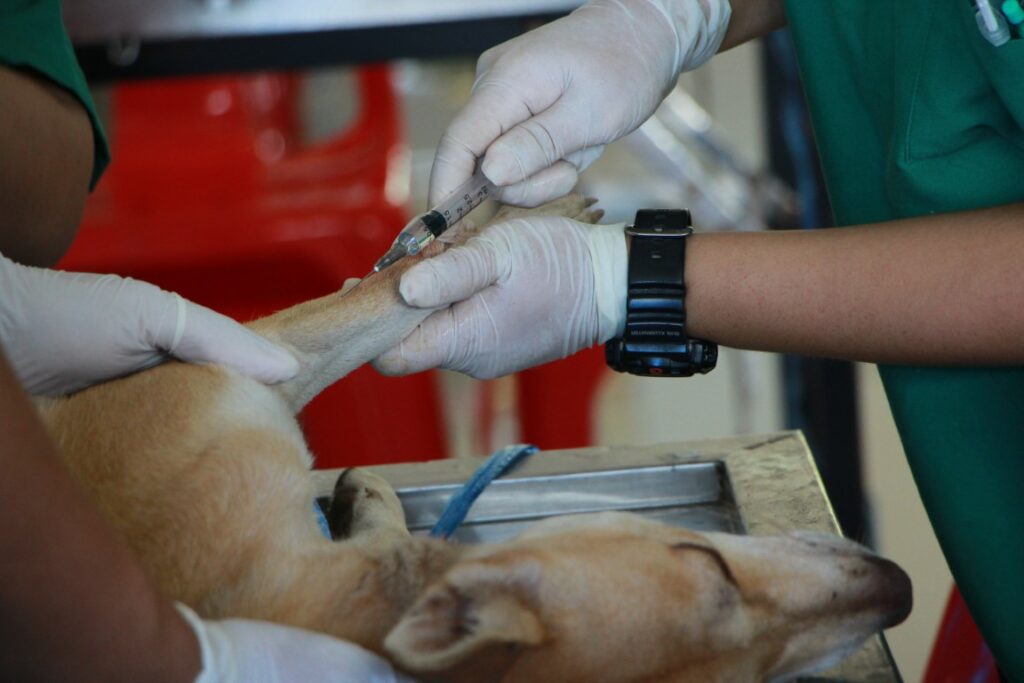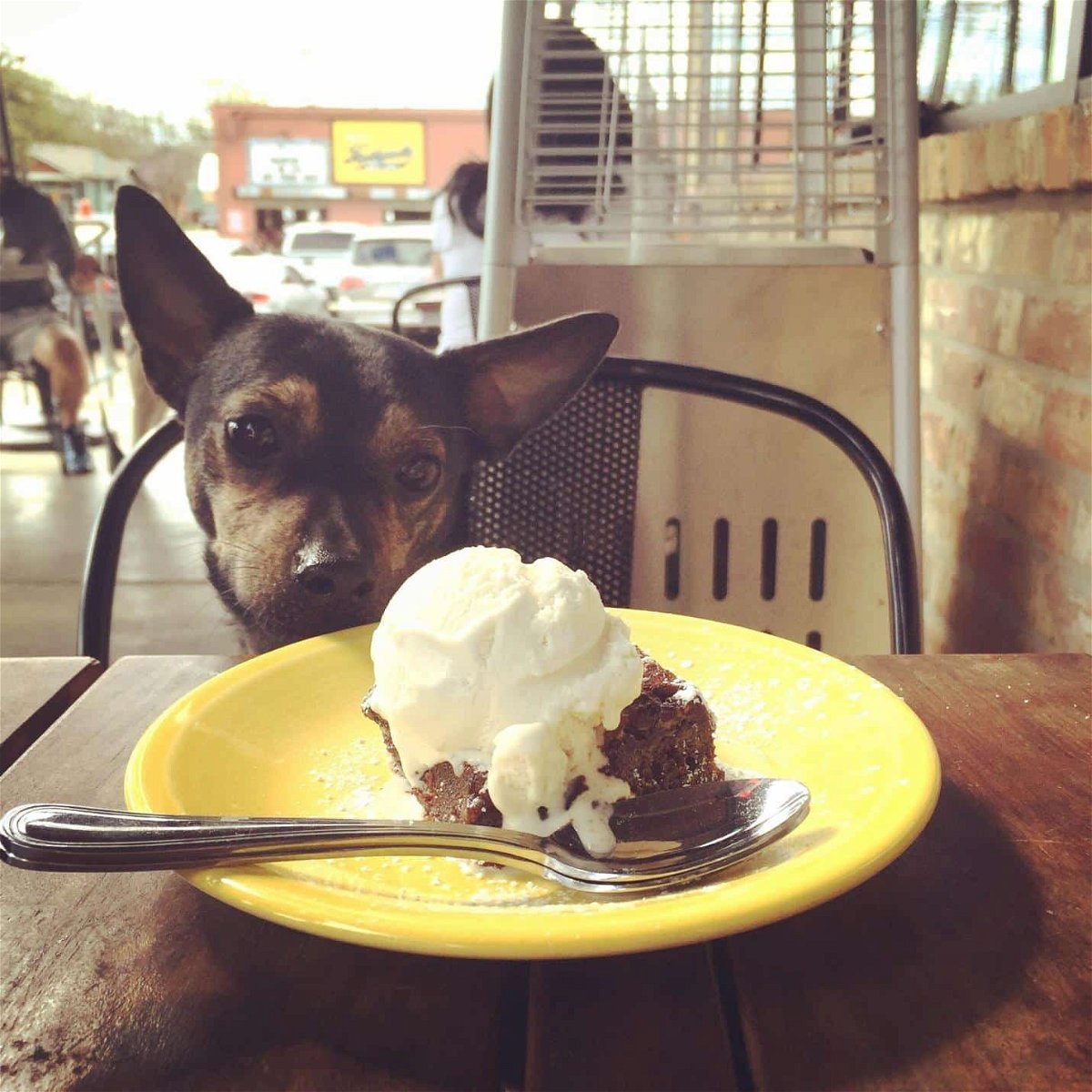We're an affiliate
We hope you love the products we recommend! Just so you know, we may collect a share of sales or other compensation from the links on this page at no additional cost to you. Thank you if you use our links, we really appreciate it!
A freshly baked brownie is an irresistible scent for most humans, so why should our dogs be any different? The nature of dogs is to be inquisitive, so they love to sniff around eat or chew anything they smell good.
Brownies have a mesmerizing smell and they attract a dog in the same way as humans. If you are not being careful they may end up eating them. No need to panic if your dog just ate brownies.
There is no doubt that chocolate can be toxic to dogs, and when consumed in large quantities, it can be very detrimental to their health.
Nevertheless, as long as the dog eats the chocolate, that does not mean that it is going to die as a result. In many cases dogs often survive chocolate poisoning without suffering any fatal consequences.
The consumption of chocolate by dogs can result in poisoning, so it is important to understand how this occurs. If your puppy eats anything that contains chocolate, such as a brownie, it is imperative that you know what steps you should take immediately.
So, let’s get started and learn more about why chocolate is bad for dogs and what to do in case of an emergency.
So can dogs eat brownies?
Do Dogs Have A Sensitivity To Chocolate?
Cocoa, the ingredient in chocolate, contains caffeine and theobromine, two compounds that are bad for dogs.
This substance, called methylxanthines, is more sensitive to dogs and they are unable to metabolize it the same way that humans do. Your dog may become toxic as a result of either of these ingredients.
Are All Types Of Chocolate Harmful To Dogs?
The short answer is no. Dogs can be toxic to chocolate depending on the type, amount, and size of the chocolate that they ate. There is also a possibility that individual sensitivity plays a role.
Compared to milk chocolate, dark chocolate contains higher levels of theobromine and caffeine. As a result, chocolate would cause fewer problems if less of it is consumed.
Neither theobromine nor caffeine can be digested by dogs, thus making them highly susceptible to their effects. Among the two, theobromine appears to be the most harmful.
Expulsion from the body is much slower than that of caffeine. Despite this, both substances can have a negative impact on dogs’ hearts, kidneys, and nervous systems.
White chocolate does not contain a sufficient amount of theobromine or caffeine to produce symptoms or illness. You should still avoid giving it to dogs due to its considerable fat and sugar levels. Chocolate should not be consumed by dogs on a regular basis.
Chocolates that are sugar-free might be even more dangerous to dogs because of the presence of xylitol, a sugar alcohol used in many foods. Xylitol can be lethal for dogs even in small amounts.
Should your dog consume sugar-free chocolate, consult your veterinarian immediately. In the event that your veterinarian is not available, we recommend taking your dog to an emergency room or calling a vet hospital for assistance.
How Many Brownies Can A Dog Eat?
A dog’s weight affects how many brownies can be consumed without causing health risks.
The degree of damage done to brownies is dependent on the type of chocolate used in their preparation. The most risk-free chocolate is white chocolate, next to milk chocolate, and then dark chocolate.
Due to its higher cocoa content, dark chocolate contains more of theobromine and caffeine, which are toxic to dogs.
Even more catastrophic is the damage that can be caused by cooking chocolate. A single ounce of Baker’s chocolate is capable of damaging as many items as several ounces of milk chocolate. Chocolate that is darker and less sweet has a greater tendency to cause harm to your dog.

As cocoa powder contains theobromine, which is still toxic even after it has been cooked, it is bad for dogs. You can use this resource to find out what harmful ingredients are contained in chocolates of various types.
How harmful a chocolate brownie is for a dog depends on the size of dog. The same amount of chocolate will likely have a less significant effect on larger breeds of dogs as it will on smaller dogs. In addition to being smaller, puppies are more likely to suffer from side effects than older dogs.
A dog who consumes one ounce of milk chocolate for every pound of body weight may experience fatal consequences.
There are approximately 2 ounces of milk chocolate in each serving of brownie. A small dog with a low body weight could suffer negative consequences if he or she eats one or more brownies.
How Do You Handle A Dog That Has Consumed Chocolate?
In the event that your dog ate chocolate brownies, what should you do? Depending on how many brownies the dog consumed, you’ll need to act quickly, and there are a few steps to follow.
Keep Your Dog Away From Brownies
Ensure that the brownies are stored in a safe place that is out of reach of the dog to prevent them from eating them.
While you clean up the mess and sort out the area, you may need to lock your pup away in a safe place. You can also use the best dog wagon for keeping your dog away or keep him entertained so he doesn’t go near brownies or forgets about them.
Calculate How Much Chocolate Was Consumed
Calculate the number of brownies that the dog ate and the type of chocolate that was contained in the brownie. The ‘total cocoa solids’ of a product is usually written on the package in the form of a percentage rather than in words.
There are online chocolate toxicity calculators you can use to find the exact amount that was consumed.
Consult Your Veterinarian
If you suspect that a pet has consumed chocolate, you should seek the advice of a vet or the Pet Poison Helpline. You should be told what to do next by them as soon as possible.
How Can Chocolate Poisoning Be Detected?
In the hours following chocolate consumption, you should be on the lookout for several signs of chocolate poisoning. It can take up to 12 hours for any signs of poisoning to become apparent, and the symptoms do not necessarily manifest themselves immediately.
It is important to recognize these symptoms as soon as they begin, since they can last up to 72 hours. The following signs may be present depending on the severity of the poisoning:
- Experiencing vomiting
- Symptoms of diarrhea
- Drinking and/or urinating more frequently
- Nervousness and excitement in general
- Tremors in muscles
- Seizures
- An increase in heartbeat or palpitations
- Collapse
The outcome of chocolate poisoning is always better if it is treated early. Consequently, if you suspect that any brownies have been consumed, or anything else they shouldn’t have eaten, you should contact the veterinarian immediately.
Remember even if the dog doesn’t experience chocolate poisoning, the sugar and fat in chocolate may still cause tummy upsets.
How Does Chocolate Poisoning Get Treated?
Your treatment will vary based on the amount and type of chocolate your dog consumed. Activated charcoal and inducing vomiting may be sufficient to prevent absorption of theobromine into the body, if the condition is treated early.
By repeating activated charcoal treatments, it is possible to reduce theobromine resorption and recirculation. Dogs typically receive intravenous fluid therapy to help stabilize their condition and promote theobromine excretion.

If your dog consumes a toxic amount of chocolate, he may get nervous, vomit, have diarrhea, show signs of agitation, and have a rapid heartbeat. It is also possible that medications will be needed to treat restlessness and other symptoms.
The Best Way To Prevent Brownie Ingestion
The best way to keep your pup safe from chocolate treats and brownies is to store them out of reach. Pets should not be given sweet treats such as brownies, cookies, or any other food that could harm them.
Keep trash bins out of the reach of pets and use child locks if necessary to stop them from rummage through your trash.You should also be cautious during high-risk holidays, such as Thanksgiving, Easter, and Christmas.
There is a good chance that some family members will be offering dog treats during such an event. It would be wise to ask your relatives to provide your dog with pet-friendly dog treats and to refrain from giving your dog any chocolate treats.
FAQ’s
- Are Brownies Poisonous to Dogs?
Yes, to some extent. If they are consumed in small quantities then there is no harm. It also depends on the chocolate used in the brownie. The white or less dark chocolate tends to be less harmful than dark chocolate.
- How Should I Respond if My Dog Consumes Chocolate?
If your pet has consumed a poisonous amount of chocolate, please contact your veterinarian as soon as you can. Your dog should be examined promptly by the vet if a toxic amount has been ingested. The earlier treatment is initiated, the better the outcome for your dog.
- How Can Chocolate Poisoning be Detected in Dogs?
According to the amount and type of chocolate ingested, clinical symptoms will vary. A variety of clinical signs can occur in dogs, including diarrhea, vomiting, excessive urination, panting, and racing heartbeat.
A severe case of this disease can result in strong tremors, seizures, and cardiac arrest. Chocolate poisoning can worsen the prognosis if complications, such as aspiration pneumonia, occur from vomiting
- Is it possible to treat your pet at home after he or she consumes chocolate?
Never attempt to treat your pet on your own unless recommended by your veterinarian or a pet poison helpline. Should something go wrong, be cautious and follow directions while doing it on recommendation.
Final Thoughts
People enjoy eating chocolate, but dogs should never be given it as a treat. Chocolate contains caffeine and theobromine, both toxic to dogs. From vomiting and diarrhea to hyperactivity and seizures, chocolate toxicity can result in a variety of symptoms.
Immediately contact your veterinarian or a pet poison hotline if your dog eats chocolate. Your next steps will be determined by them.
Activated charcoal and vomiting may be administered by your veterinarian if caught early so that the symptoms do not worsen. The treatment of severe cases may require supportive therapies such as fluid administration, medication, or sedation.
Laura is the founder of Furs'n'Paws. She is a also a pet writer and expert with more than 20 years of experience of working with dogs and cats. She developed a very strong love for animals at a young age. Her passion led her to establish a thriving pet sitting and dog walking business in Dubai. As an expert in pet training, behavior, and nutrition, Laura is committed to helping pet owners and pet lovers by offering high-quality information on a wide range of topics.



No responses yet